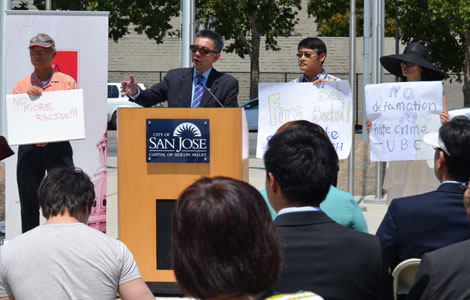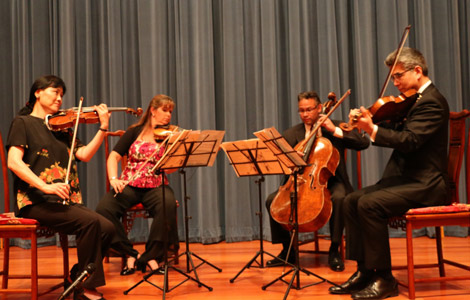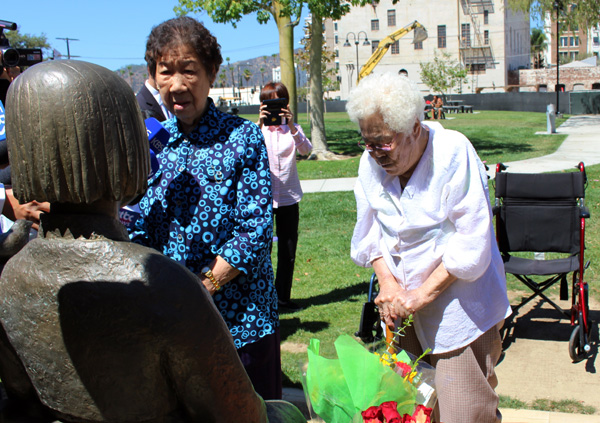Apologizing for atrocities
Updated: 2014-07-30 08:04
By He Na and Zhang Lei (China Daily)
|
||||||||
Calls are growing for Japan to take full responsibility for its 'comfort women' sex crimes during the war, report He Na and Zhang Lei.
In late July, two Korean women, both in their 80s, made a long journey to the United States. The two had been forced to serve as sex slaves for the Japanese during the war. They traveled to the US to call for an apology from the Japanese government. "It's as if the Japanese government is putting off apologizing and is just waiting for us to all die. But we must receive an apology," Lee Ok-son told reporters in Los Angeles on July 22.
"I will never forget that we've had to go through this, and I will repay what I've had to go through even after I die," the other woman, Kang Il-chul, added.
Imperial Japan used the euphemism "comfort women" to refer to young women of various ethnic and national backgrounds and social circumstances who were forced to offer sexual services to Japanese troops before and during World War II, C. Sarah Soh, historian and professor at San Francisco State University, explained in her essay Japan's Responsibility Toward Comfort Women Survivors.
In one of the latest signs of growing concern over the issue, the United Nations Human Rights Committee on July 24 requested that Japan make immediate and effective efforts to redress the atrocities.
The committee made the request in its concluding observations on the sixth periodic report of Japan's implementation of the International Covenant on Civil and Political Rights in Geneva, Xinhua News Agency reported.
The Korean women who recently called for the Japanese apology are only two representatives of the numerous sex victims during WWII. The nonprofit advocacy group Washington Coalition for Comfort Women Issues estimated the number ranges from 100,000 to 400,000.
"It's difficult to ascertain the exact number, but it's widely believed some 200,000 Chinese women were abused based on the decades of research by historians," said Su Zhiliang, director of the China "Comfort Women" Issue Research Center at Shanghai Normal University.
"As of 2013, many surviving comfort women would probably be approaching their 90s, and in China there are only 23 identified publicly who are still alive.
"I often visit them. The most recent one I visited was Li Xiumei in April in Shanxi province. Unfortunately, she's in poor health and living in poverty," Su said.
"And the destiny of other comfort women has been no better. They are all suffering various kinds of diseases and living in misery. It's a shame that they will probably all eventually die without hearing an official apology or receiving compensation from Japan."
"With more in-depth research, confidential information, testimonies and confessions being opened to the public, we have enough evidence to show the world that the comfort women system was not made up of the individual acts of Japanese soldiers, but was a government initiative.
"The system resulted in the largest, most methodical and deadly mass rape of women in recorded history. It is a global issue worthy of attention from the entire world," Su said.

 Silicon Valley rally calls on Fox News to fire Beckel
Silicon Valley rally calls on Fox News to fire Beckel
 Look who's two, Xiao Liwu!
Look who's two, Xiao Liwu!
 Philadelphia Orchestra meets the press
Philadelphia Orchestra meets the press
 Chinese, US naval hospital ships conduct exchange
Chinese, US naval hospital ships conduct exchange
 High rent pressures NYC Asian eateries
High rent pressures NYC Asian eateries
 Artists advocate for environmental protection
Artists advocate for environmental protection
 Wichita, Kansas to Xi'an, China: Come fly with us
Wichita, Kansas to Xi'an, China: Come fly with us
 Amateur team aims for great heights
Amateur team aims for great heights
Most Viewed
Editor's Picks

|

|

|

|

|

|
Today's Top News
Ex-security chief Zhou Yongkang under probe
Prudence urged over solar dispute
US visa delays likely to continue
McDonald's fishing for supplier
OSI group to fund food safety
China's FDI in US set for increase
Glitch delays visas for US-bound students
A musical spoof of the Clinton years
US Weekly

|

|







